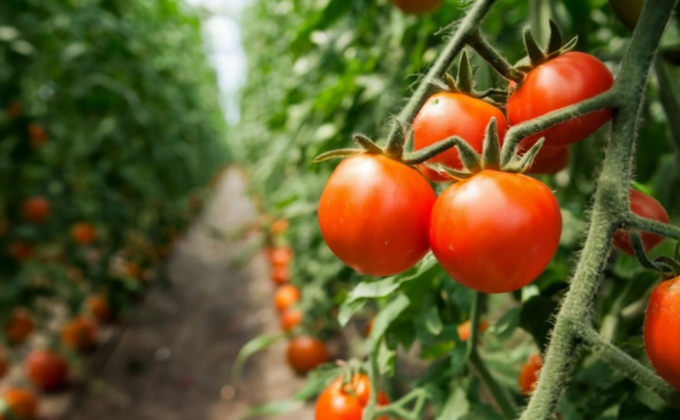June 19, 2025 | 12:31 GMT +7
June 19, 2025 | 12:31 GMT +7
Hotline: 0913.378.918
June 19, 2025 | 12:31 GMT +7
Hotline: 0913.378.918

A study of the unique behaviour of the tomato’s immune system led structural biologist Chai Jijie and his colleagues to unlock the secret of how plants defend themselves from pest and disease attacks. Photo: Shutterstock.
After decades of research and numerous setbacks, Chinese biologist Chai Jijie – described as one of the world’s leading scientists in his field – has achieved a breakthrough that could help to control and prevent pests and diseases in crops.
Chai, a former paper mill worker and now a professor with the school of life sciences at Westlake University in China’s Zhejiang province, was part of a global team that has unravelled the secrets of how plants defend themselves from attack.
The findings, published this month in the journal Nature, has the potential to significantly boost global food production, according to the paper.
The United Nations Food and Agriculture Organisation estimates that between 20 and 40 per cent of global crop production is lost each year because of plant pests and microbial pathogen infections.
According to the paper, the scientists found their first clue in tomatoes, which feature a class of proteins that behave differently from those found in the immune systems of other plants.
Most plants have two lines of immune defence – one on the surface of its cells and another inside them, dominated by a disease-resistant protein called NLR.
These proteins, encoded by disease-resistance genes, recognise specific invading pathogens and flood the immune system, triggering an efficient and rapid response, helping the plant to deal with its enemies.
Usually, the proteins are tightly regulated and present at relatively low levels. But in the heat of battle, when the immune response is activated, it can trigger a “suicide” mechanism leading to cell death and inhibiting plant growth.
However, the researchers found that tomatoes had a class of proteins from the same family that did not seem to follow this pattern.
According to Chai and his colleagues, levels of this protein – called NRC – remain high, regardless of whether the plant is under attack, potentially triggering an immune system overreaction and even cell suicide.
The researchers analysed the structure of the tomato proteins and established that they remain stable by assembling into different forms with the help of a small organic molecule that is involved in the process of the plant’s energy metabolism.
Cao Yu, a researcher who works in the same laboratory as Chai, said the identification of the mechanism, including the helper, “has important implications” by providing a new theoretical basis for crop breeding and pest control.
The research could open up new agricultural biotechnologies to improve disease resistance in crops without interfering with their normal growth and yield by inducing an excessive immune response, he said.
Scientists have long known that plants, like animals, are equipped with an immune system, with the cloning of the first plant disease resistance gene providing molecular proof in 1994. But the biochemical functions of plant NLR proteins remained poorly understood.
Chai, who spent four years working in a paper mill in northeastern China, began his career as a protégé of structural biologist Shi Yigong, now president of Westlake University.
Shi, who was a young assistant professor at Princeton University’s molecular biology department, accepted Chai as his first postdoctoral fellow in 1999.
Last year, in an interview with The Economic Observer in China, Shi described his former student as “one of the world’s leading scientists” in his field.
On his return to China in 2004, Chai joined the National Institute of Biological Sciences in Beijing as an independent principal investigator, focusing his research on the then-fledgling field of plant immunology.
Last August, Chai and his long-time collaborator Zhou Jianmin won China’s prestigious Future Science Prize for their pioneering contributions to the understanding of immune mechanisms in plants.
Zhou, a researcher at the Chinese Academy of Sciences’ Institute of Genetics and Developmental Biology, and Chai shared in the US$1 million prize, initiated in 2016 by a group of scientists and entrepreneurs to promote basic scientific research in China.
The privately funded award recognises outstanding scientists in three main areas – life sciences, physical sciences, and mathematics and computer science.
(SCMP)

(VAN) Extensive licensing requirements raise concerns about intellectual property theft.

(VAN) As of Friday, a salmonella outbreak linked to a California egg producer had sickened at least 79 people. Of the infected people, 21 hospitalizations were reported, U.S. health officials said.

(VAN) With the war ongoing, many Ukrainian farmers and rural farming families face limited access to their land due to mines and lack the financial resources to purchase needed agricultural inputs.

(VAN) Vikas Rambal has quietly built a $5 billion business empire in manufacturing, property and solar, and catapulted onto the Rich List.

(VAN) Available cropland now at less than five percent, according to latest geospatial assessment from FAO and UNOSAT.

(VAN) Alt Carbon has raised $12 million in a seed round as it plans to scale its carbon dioxide removal work in the South Asian nation.

(VAN) Attempts to bring down the price of the Japanese staple have had little effect amid a cost-of-living crisis.